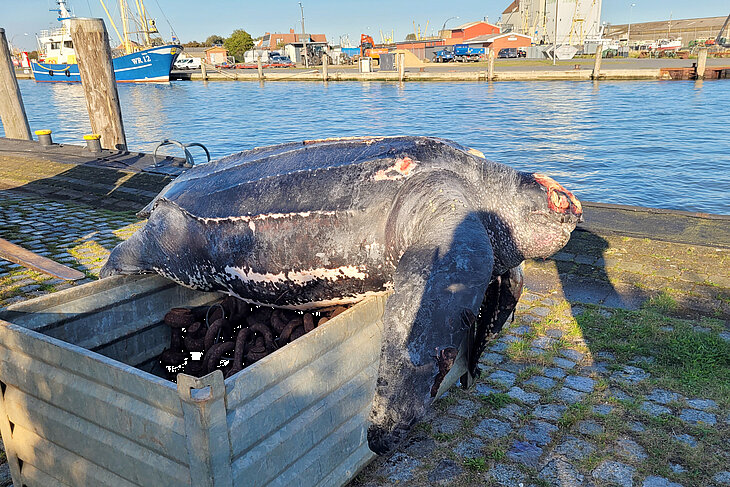
| Project data | |
|---|---|
| Project leader: | Prof. Prof. h. c. Dr. Ursula Siebert |
| Scientific staff: | Caroline Berger, Dr. Stephanie Groß |
| Project term: | January 2025-December 2025 |
| Sponsorship: | Ministry of Energy transition, climate protection, environment and nature (MEKUN) |

Project description
Recently, there has been an increase in strandings of sea turtles on the Schleswig-Holstein coast. Between 2022 and 2024, a total of five animals have stranded so far. The loggerhead turtle, leatherback turtle and Atlantic bastard turtle were found.
The reasons for the current increased occurrence of sea turtles in the North Sea are not known. In general, the water temperatures here are too cold for the animals, especially in winter. As a result, the animals enter a state of rigidity, as reptiles are highly dependent on the ambient temperature. In this state, the animals can no longer move actively and drift with the current. The recent increase in the number of finds could indicate a new trend, but this will have to be confirmed over the next few years. However, due to the expected rise in temperature as a result of climate change, a more frequent occurrence of these sea creatures on our coasts seems likely in the long term.
The main aim of this pilot study is to collect data on the occurrence of sea turtles on the coasts of Schleswig-Holstein. Dead stranded sea turtles will be dissected at the Institute for Terrestrial and Aquatic Wildlife Research (ITAW) in order to uncover the causes of stranding and the incidence of disease.
The project is divided into the following five subsections.
1. data collection: Data on sea turtles stranded on the Schleswig-Holstein coast will be collected. To this end, contact is made with various stakeholders such as the LKN, the Wadden Sea Protection Station, the Jordsand e.V. association and local fishermen. The strandings that occur during the course of the project are also recorded.
2. genetic studies: Samples from dead and live stranded turtles will be genetically analyzed to determine the species and subpopulation.
3. dead body monitoring: Dead stranded sea turtles will be pathologically examined at the ITAW to obtain information on morphometrics, age, sex and disease incidence. In addition to recording biometric data, a macroscopic examination of the carcass is carried out. Depending on the state of preservation of the carcass and the presence of signs of disease, further examinations are carried out. These include histology, parasitology and microbiology.
4. participation in live strandings: The ITAW supports the country in the event of live strandings. This includes advice, contacting international experts, investigation and sampling.
5. establishment of international contacts: This project also aims to establish contacts with sea turtle experts in Europe and worldwide, firstly to become part of the global turtle network and secondly to be able to obtain expert advice on various topics.
In this video, an ITAW vet examines a loggerhead sea turtle for external abnormalities (e.g. skin changes, nasal discharge).
The turtle was stranded on Sylt in winter 2024/2025 and is being rehabilitated at the Sylt Aquarium.

Please note: Once you watch the video, data will be transmitted to Youtube/Google. For more information, see Google Privacy.
Contact person
Stiftung Tierärztliche Hochschule Hannover
Institute for Terrestrial and Aquatic Wildlife Research
Werftstr. 6
25761 Büsum
Dr. Staphanie Groß
Phone: +49 (0)511-8568163


